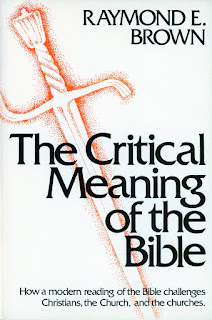crit-i-cal (adj.)
1. exercising or involving careful judgment or judicious evaluation: a critical analysis
2. of essential importance; indispensable: a critical ingredient
3. containing or making severe or negative judgments: a critical attitude
4. characterized by risk or uncertainty: the patient is in a critical condition
I chose the title “The Critical Bible” for this blog because of the various nuances of the word “critical”. It captures how the Bible means different things for different people.
Many believers accept the Bible as absolutely essential for this life and the one hereafter. The Bible has all the answers. The Bible is the indispensable book.1. exercising or involving careful judgment or judicious evaluation: a critical analysis
2. of essential importance; indispensable: a critical ingredient
3. containing or making severe or negative judgments: a critical attitude
4. characterized by risk or uncertainty: the patient is in a critical condition
I chose the title “The Critical Bible” for this blog because of the various nuances of the word “critical”. It captures how the Bible means different things for different people.
Some secularists reject the Bible because it is too severe and judgmental, reflecting a culture and society that is incompatible with contemporary life. The Bible and those who believe it to be God's word are too intolerant.
For many others, they don’t know what to make of the Bible. They are told that it is something they need to read and study but don’t know how to approach it. If they have tried to read it, they end up getting confused by it. They are caught between biblical fundamentalists who insist that every word of the Bible must be understood in the most literal sense and radical secularists who consider the Bible as a book of fairy tales featuring a talking snake and a virgin who gives birth.
At various times in my life, I have found myself in varying degrees of agreement with all of these positions. What allowed me to understand the Bible were the methods of biblical criticism. Starting with the proposition that the Bible is the word of God in the words of human beings, then the biblical text can be studied just as any other human text can be studied. You can ask who wrote the text for what audience and when. Answering these questions helped me understand the Bible in context.
So in these essays, I will be putting emphasis on a critical examination of the Bible using what we know from science and history. I hope to explain not just what biblical scholars say but the reasoning behind why they say what they say. |
| "I believe that a critical reading of the Bible is 'critical' or crucial to the Churches and to thinking Christians." -- Raymond E. Brown |
I don’t see the Bible as irrelevant to modern society. In fact, I believe that a basic understanding of the Bible is needed for anyone who wants to be culturally literate. So I will argue against those who reject the Bible out of hand as merely “a collection of fairy tales” by showing how the Bible, properly understood, has relevance for today.
But, at the same time, I am opposed to those who would like to impose their belief that the Bible should be the foundation of laws and social institutions. I will show how their interpretations of the biblical text are either erroneous or inconsistent. The Bible may be a source of truths and values, but it is not the only source of truths and values.
Finally, I hope to shed light on obscure or downright weird passages in the Bible that make people scratch their heads. I would like a reader of these essays to come away with an understanding of biblical terms and concepts that perhaps didn’t make sense before. To use medical terminology, I hope my articles will provide some life support to stabilize the patient to the point where they are no longer on the critical list and can do further study on their own and draw their own conclusions.
At the end of the day, you shouldn't be taking my word or the word of anyone else you read on the Internet. Trust in yourself and your own judgment, based on evidence that has been presented to you.
To quote from Luke 12:57: “And why do you not judge for yourselves what is right?”